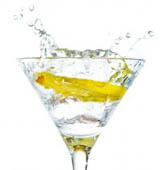
Purpose
To determine whether a lemon will float in water or sink to the bottom.
Additional information
Lemons are among the most common fruits used in science experiments, and for good reason. Their highly acidic nature makes them a good candidate for numerous chemistry experiments. In this experiment, however, we don't care about the acidic nature of the lemon. We'll be exploring another use for it... to see if the lemon will sink or float when placed in a bowl of water! Lemons, the all purpose scientific fruit that everyone loves!
Sponsored Links
Required materials
- Whole lemon
- Bowl
- Water
- Knife
- Cutting board
Estimated Experiment Time
Less than 5 minutes.
Step-By-Step Procedure
- 1. Fill the bowl with water so it's about 3/4ths full.
- 2. Place the whole lemon into the water. What happens? It floats!
- 3. Cut the lemon into 4 pieces.
- 4. Place the lemon pieces individually into the water. What happens?
Note
As always, be careful when cutting the lemon. Use a cutting board and make sure to ask for help from an adult if you need it! Also, make sure you use a relatively deep bowl so you can fill it with enough water so the lemon doesn't touch the bottom.
Observation
What other fruits could you try this experiment on? Try to find an alternative and see if you come up with the same results. Can you think of a fruit that would always sink, regardless of being cut or not? How about one that will always float?
Result
When the lemon pieces are placed into the water... they sink! This is because the lemon pulp fills with water after it's been cut. The weight from the water causes the lemon pieces to sink to the bottom of the bowl. The outer skin of the lemon is waterproof and protects the lemon from rain and harsh weather as it grows. It acts as a barrier to keep unwanted elements out while keeping the lemon pulp safe inside.
Sponsored Links
Take a moment to visit our table of Periodic Elements page where you can get an in-depth view of all the elements,
complete with the industry first side-by-side element comparisons!